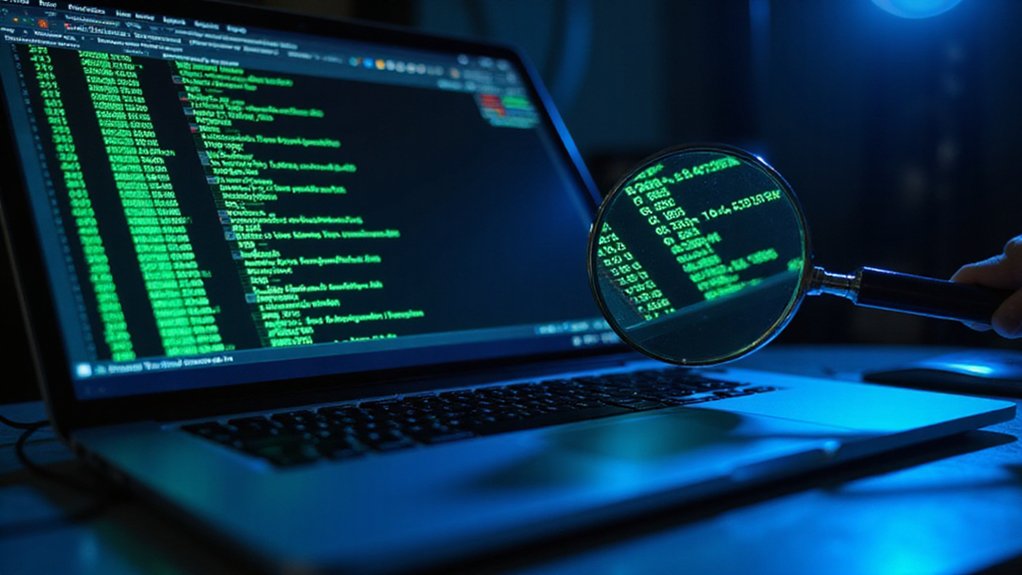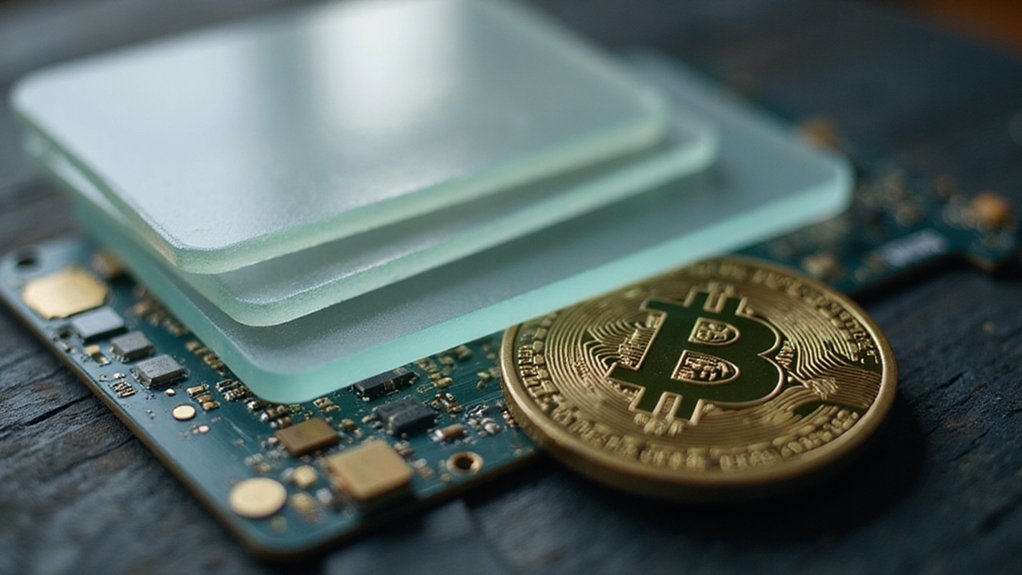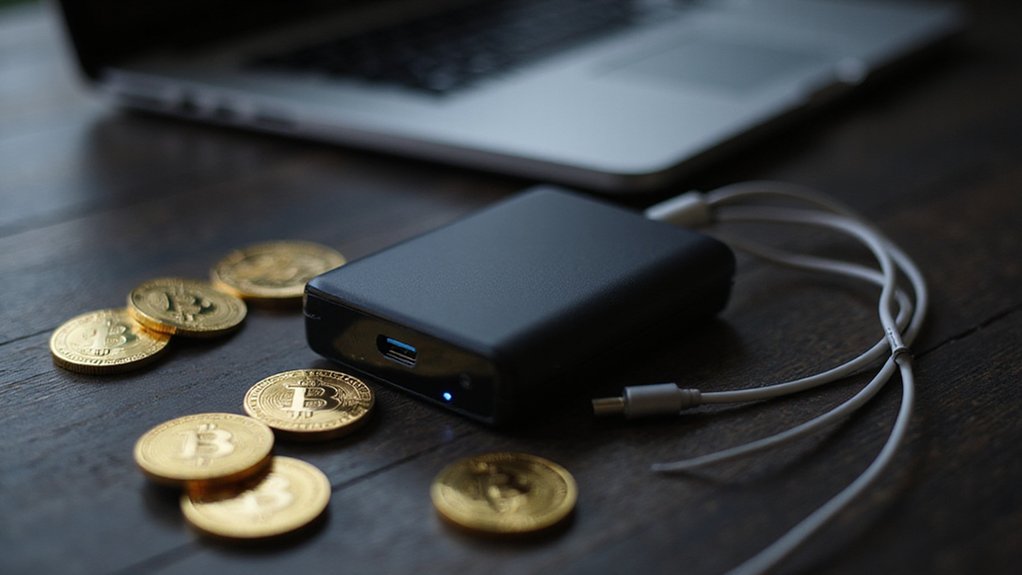Cryptocurrency address lookups require nothing more than blockchain explorers like Blockchain.com for Bitcoin or Etherscan for Ethereum—simply paste the target address into the search bar. These tools transform cryptic alphanumeric strings into detailed transaction histories, revealing timestamps, amounts, and wallet balances with the permanence of digital stone. The process democratizes financial surveillance, turning public ledgers into accessible investigative resources that expose every transfer, however desperate or clandestine the original intent. The implications extend far beyond simple curiosity.

The digital breadcrumbs of cryptocurrency transactions tell stories that would make even the most seasoned financial detective pause—every Bitcoin sent to a sketchy exchange, every Ethereum transfer at 3 AM, every desperate attempt to move funds through a labyrinth of wallets remains etched in blockchain stone for eternity.
Performing a cryptocurrency address lookup requires nothing more than a blockchain explorer and basic internet literacy (though some might say the latter is increasingly rare). These digital forensic tools, such as Blockchain.com for Bitcoin or Etherscan for Ethereum, transform incomprehensible strings of alphanumeric characters into readable transaction histories that would make any accountant weep with joy.
The process itself is remarkably straightforward: navigate to the appropriate blockchain explorer, paste the target address into the search bar, and witness the unfolding financial autobiography of whoever controls those private keys. Bitcoin addresses, typically 34 characters long, reveal their secrets differently than Ethereum’s 42-character addresses beginning with “0x”—each blockchain maintaining its own peculiar formatting conventions like financial snowflakes.
What emerges from these lookups often reads like a thriller novel written by someone with an MBA.
Transaction histories unfold like financial crime dramas, complete with suspicious timing, mysterious transfers, and plot twists that would impress Hollywood screenwriters.
Transaction histories display every incoming and outgoing transfer, complete with timestamps, amounts, and confirmation statuses.
The explorer parses raw blockchain data into digestible formats, showing total funds received, sent, and current balances with the precision of a Swiss timepiece (and considerably more transparency than Swiss banking). Different address formats provide distinct investigative clues, as P2PKH addresses starting with “1” operate differently from newer P2SH addresses beginning with “3” or modern Bech32 addresses that start with “bc1q”.
Advanced analysts employ clustering techniques to group related addresses, identifying patterns that reveal user behavior across multiple wallets. Law enforcement agencies have turned these public ledgers into investigative gold mines, tracking illicit funds through networks that criminals mistakenly believed provided anonymity. These lookups enable investigators to conduct due diligence by identifying suspicious trends, tracking active wallets across different networks, and mapping the intricate flows that define modern cryptocurrency markets.
The irony remains delicious: a technology designed to eliminate traditional financial intermediaries has created the most transparent financial system in human history.
Every transaction sits permanently on public ledgers, accessible to anyone with internet access and sufficient curiosity.
While private keys must remain secure—possession grants complete control over associated funds—the addresses themselves broadcast their activities with the subtlety of Times Square billboards. Bitcoin wallets use these private keys to authorize transactions while generating public keys that create the unique addresses visible on blockchain explorers.
No registration, fees, or permissions are required for these lookups, democratizing financial surveillance in ways that would make both privacy advocates and compliance officers simultaneously celebrate and panic.
Frequently Asked Questions
Can I Lookup a Cryptocurrency Address Without Revealing My Own Identity?
One can indeed perform cryptocurrency address lookups while preserving anonymity through various methods.
Utilizing Tor browsers or VPN services masks IP addresses during blockchain queries, while privacy-focused tools like Electrum provide additional obfuscation layers.
However, this digital cat-and-mouse game becomes increasingly complex as regulatory bodies develop sophisticated tracking mechanisms.
The irony remains palpable: seeking transparency about others’ transactions while desperately maintaining one’s own opacity—a quintessentially modern financial paradox.
How Often Should I Perform Address Lookups for Security Purposes?
Address lookup frequency depends on transaction patterns and risk tolerance—daily monitoring suffices for active traders, while weekly checks accommodate casual users.
Pre-transaction verification remains non-negotiable, though excessive lookups border on paranoia (and potentially compromise the anonymity previously discussed).
Regular blockchain monitoring detects suspicious activity, but obsessive checking often reveals more about one’s anxiety than actual security threats.
Balance vigilance with practicality: monthly thorough reviews paired with transaction-specific verification typically provide adequate protection without inducing crypto-induced insomnia.
Are There Legal Restrictions on Performing Cryptocurrency Address Lookups?
Cryptocurrency address lookups face minimal legal restrictions for ordinary users, since blockchain data remains publicly accessible.
However, entities classified as Money Services Businesses must implement mandatory OFAC sanctions screening—making address verification legally required rather than restricted.
The regulatory framework creates an amusing paradox: while individual curiosity about wallet addresses encounters no barriers, professional compliance obligations actually mandate such lookups, transforming optional due diligence into regulatory necessity.
Can Deleted or Old Cryptocurrency Addresses Still Be Looked Up?
Cryptocurrency addresses, once created and utilized, achieve a peculiar form of digital immortality—persisting indefinitely on their respective blockchains regardless of whether users consider them “deleted.”
The immutable nature of distributed ledgers guarantees that even supposedly abandoned addresses remain searchable through blockchain explorers, complete with their entire transaction histories.
This permanence (somewhat ironically) means that what users perceive as deletion merely represents cessation of use, not actual erasure.
What Happens if I Lookup an Address That Doesn’t Exist?
When querying a nonexistent cryptocurrency address, blockchain explorers simply display an empty record—zero balance, no transaction history, pristine nothingness.
The address itself remains mathematically valid (assuming proper checksum formatting) yet practically dormant, like an unopened bank account.
Should someone eventually generate the corresponding private key—astronomically unlikely given the vast address space—any previously sent funds would miraculously become accessible, though such serendipity borders on mathematical impossibility.









